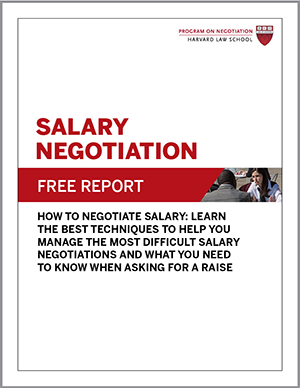How To Negotiate A Higher Salary After A 'Best And Final' Offer

Table of Contents
Understanding the "Best and Final" Offer
What it Really Means:
The phrase "best and final offer" is often a negotiating tactic, not a statement of unwavering fact. Companies sometimes use this phrase to put pressure on candidates and try to close the deal quickly. It's a common strategy, but it doesn't necessarily mean they're unwilling to negotiate further.
- It's rarely truly final, especially if you possess in-demand skills or experience. The company likely wants to fill the position, and a slightly higher salary might be a worthwhile cost for them.
- The employer might be willing to budge if you present a strong case that demonstrates the value you bring, exceeding their initial expectations.
- Understanding their perspective is crucial before counter-offering. Consider their potential reasons for offering what they did—budgetary limitations, internal benchmarks, or simply an initial lowball offer.
Preparing Your Counter-Offer Strategy
Researching Market Value:
Knowing your worth is paramount to successful salary negotiation strategies. Before you even consider a counter-offer, thoroughly research the market value for your position and experience level.
- Use salary comparison websites like Glassdoor, Salary.com, Payscale, and LinkedIn Salary to research industry averages for similar roles in your location.
- Network with peers and colleagues in similar roles. Informal conversations can provide invaluable insights into compensation packages and negotiation experiences. Don't be afraid to ask for anonymized salary information.
- Quantify your value – highlight quantifiable achievements and contributions from previous roles. Use metrics and numbers to demonstrate the impact you've had in past positions.
Articulating Your Value Proposition:
Once you've researched your worth, it's time to craft a compelling narrative that clearly articulates your value to the potential employer. Your value proposition should demonstrate why you are worth more than the initial offer.
- Highlight quantifiable achievements and contributions using the STAR method (Situation, Task, Action, Result). Focus on results, not just responsibilities.
- Focus on how your skills and experience directly benefit the company. Show them the return on investment (ROI) they'll get by hiring you at a higher salary.
- Prepare a concise and compelling statement outlining your value. This statement should be easily adaptable for both email and phone conversations. Practice delivering it confidently and clearly.
Delivering Your Counter-Offer with Confidence
Choosing the Right Communication Method:
Consider the nuances of different communication methods when delivering your counter-offer. Both email and phone calls have advantages and disadvantages.
- Email allows for a well-structured, documented approach. It provides a record of your negotiation and prevents misunderstandings.
- A phone call allows for immediate feedback and negotiation. It also permits more nuanced communication and allows you to gauge the employer's reaction in real-time.
- Maintain professionalism and a positive tone regardless of the chosen method. Remember, even if you're pushing for a higher salary, maintaining a respectful and collaborative tone is crucial.
Negotiating with Confidence and Grace:
Delivering your counter-offer requires confidence and grace. Prepare for potential pushback, and remember that a successful counter offer negotiation often involves compromise.
- Express gratitude for the offer. Acknowledge their effort in extending the offer before stating your desired salary increase.
- Clearly state your desired salary increase, justifying it with your value proposition and market research. Provide specific numbers and support your claims with data.
- Be prepared to compromise – have a range in mind, not just one fixed figure. This shows flexibility and a willingness to work towards a mutually beneficial agreement.
Handling Potential Objections and Rejections
Addressing Their Concerns:
Be prepared for potential objections. Companies often cite budget constraints or internal equity issues as reasons for not increasing the offer.
- Prepare responses to common objections. Anticipate possible counterarguments and formulate well-reasoned responses beforehand.
- Be prepared to negotiate on other aspects (e.g., benefits, vacation time, signing bonus, professional development opportunities). A slightly lower salary increase might be acceptable if coupled with more generous benefits.
- Don't be afraid to walk away if the offer isn't acceptable. Knowing your worth and your bottom line is crucial. Don't undervalue yourself.
Knowing When to Walk Away:
Knowing when to accept an offer or walk away is a crucial part of the salary negotiation process. It involves weighing various factors beyond just the salary itself.
- Consider the overall package (salary, benefits, career growth potential, company culture, work-life balance). The complete compensation package should be factored into your decision.
- Evaluate your priorities and your BATNA (Best Alternative To a Negotiated Agreement). What's your next best option if this negotiation fails?
- Walking away is acceptable if the offer doesn't meet your needs and expectations. Your time and skills are valuable; don't settle for less than you deserve.
Conclusion:
Successfully negotiating a higher salary after a "best and final" offer requires preparation, confidence, and a clear understanding of your worth. By researching market rates, articulating your value, and approaching the negotiation with professionalism, you significantly increase your chances of securing a more favorable compensation package. Remember, knowing your worth and presenting a strong case are key to successfully negotiating a higher salary. Don't hesitate to utilize these strategies to negotiate a higher salary and achieve your desired compensation. Start planning your successful salary negotiation today!

Featured Posts
-
 Manchester United Manager Search Ten Hags Leverkusen Links
May 23, 2025
Manchester United Manager Search Ten Hags Leverkusen Links
May 23, 2025 -
 Bbcs Four Year Partnership With The Ecb Confirmed
May 23, 2025
Bbcs Four Year Partnership With The Ecb Confirmed
May 23, 2025 -
 Swiss Village Evacuated Amid Imminent Landslide Risk
May 23, 2025
Swiss Village Evacuated Amid Imminent Landslide Risk
May 23, 2025 -
 Kristi Ano Ronaldo Mu Chestita Na Kho Lund Poraka Po Imitatsi Ata Na Slavnoto Slav E
May 23, 2025
Kristi Ano Ronaldo Mu Chestita Na Kho Lund Poraka Po Imitatsi Ata Na Slavnoto Slav E
May 23, 2025 -
 Exploring Neal Mc Donoughs Character In The Last Rodeo
May 23, 2025
Exploring Neal Mc Donoughs Character In The Last Rodeo
May 23, 2025
Latest Posts
-
 Jonathan Groff Eyes Tony Award Glory With Just In Time
May 23, 2025
Jonathan Groff Eyes Tony Award Glory With Just In Time
May 23, 2025 -
 Is Jonathan Groffs Just In Time Performance Tony Worthy
May 23, 2025
Is Jonathan Groffs Just In Time Performance Tony Worthy
May 23, 2025 -
 Jonathan Groff Tony Award Nomination Potential For Just In Time
May 23, 2025
Jonathan Groff Tony Award Nomination Potential For Just In Time
May 23, 2025 -
 Jonathan Groff And Just In Time A Tony Awards Prediction
May 23, 2025
Jonathan Groff And Just In Time A Tony Awards Prediction
May 23, 2025 -
 Could Jonathan Groff Make Tony Awards History With Just In Time
May 23, 2025
Could Jonathan Groff Make Tony Awards History With Just In Time
May 23, 2025
